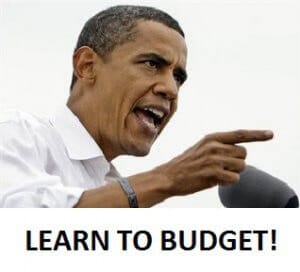J.D. Vance, venture capitalist and author of Hillbilly Elegy, speaks on the American Dream and our Civilizational Crisis....
Obama Wants You to Budget Responsibly
President Obama has declared this April to be National Financial Capability Month, 2013. America has a 16 trillion dollar national debt and 1 trillion dollar budget deficit, which works out to a $50,000 share per American citizen. That’s right. The government of this country would like to “recommit to empowering individuals and families with the knowledge and tools they need to get ahead in today’s economy,” while harbouring the largest debt in American history. Do as we say and not as we do, perhaps?
There is also a Financial Literacy and Education Commission. Supposedly real persons make up this commission, but no names are listed anywhere. All of the bureaucrats on the commission come from mysterious federal entities, including but not limited to: the Board of Governors of the Federal Reserve System, the Commodity Futures Trading Commission, Health and Human Services, the Department of Housing and Urban Development, the Department of Labor, the Department of the Treasury, the Office of the Comptroller of the Currency, and the Social Security Administration.
Who better to go to financial advice?
When the Commission is not giving away “FREE” Personal Financial Toolkits (which can be ordered from a “toll-free” hotline), they are busy convening for a National Research Symposium on Financial Literacy and Education, writing National Strategy Background reports, and making Research Priorities.
It is bad enough that the federal government is trying to be “your trusted source for financial information.” But in addition to this, the federal documents reveal the intent to conduct “longitudinal studies on financial behavior changes [that] are needed to better understand how behaviors are formed and changed.” The problem is that even with all the new knowledge potentially espoused through financial literacy efforts (HA! Yea, right.), actual behaviour might not change at all. That is human nature, not financial illiteracy. But unchangeable human nature will not deter progressive, process-loving bureaucrats from participation in ceaseless make-work projects that offer them the chance to try and change it anyway.
Robert Kiyosaki, the author of the best-selling personal finance book of all time, Rich Dad, Poor Dad, recently published another book in 2011 titled, The Unfair Advantage: The Power of Financial Education. In that book, Kiyosaki asks and answers the following question:
Why is there not any financial education in schools?
If a person has a solid financial education, they will not cling so tightly to job security, a steady paycheck, and a pension. If a person knows the tax laws, they will not pay unnecessary taxes. If they understand the banking system, they will not save money. Rather than call their home an asset, they will know that it is a liability. If they understand inflation, they will not try to live below their means. Rather than get out of debt, they will learn to use debt to gain wealth. And they will not mindlessly turn their money over to Wall Street bankers, financial planners, and real estate agents in the hope of obtaining a secure retirement.
Most importantly, they will question why they are going to school, who their teachers are, and where their education is leading them.”

So there you have it. Obama has “called upon all Americans to observe this month with programs and activities to improve their understanding of financial principles and practices.” You owe it to yourself to not take any of the federal government’s advice about financial capability very seriously. Check out this Robert Kiyosaki clip.
Get the Collegiate Experience You Hunger For
Your time at college is too important to get a shallow education in which viewpoints are shut out and rigorous discussion is shut down.
Explore intellectual conservatism
Join a vibrant community of students and scholars
Defend your principles
Join the ISI community. Membership is free.
